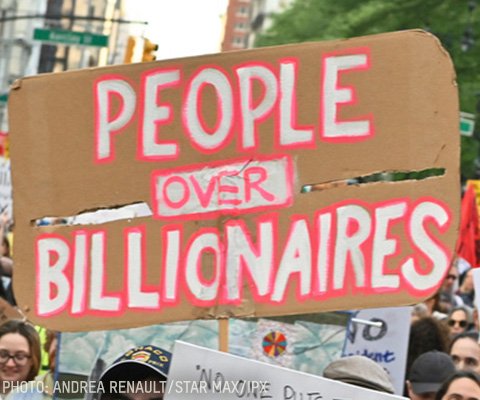Press releases
Timely communications on global policy decisions, emerging crises, and our work in the affected areas.
Search model: Articles | Press release
Search root:
Author: None
Topics:
Policy topics:
Locations:
Tags:
Use data-feed: /datafeed/?m=60&perpage=10
- President Trump launches 'pay-to-play' Board of Peace at Davos — Oxfam
- Jan. 22, 2026
- President Trump ‘brought let them eat cake economics to Davos’ with WEF speech — Oxfam
- Jan. 21, 2026
- Nearly 80 percent of millionaires think super-rich buy political influence
- Jan. 20, 2026
- Billionaire wealth jumps three times faster in 2025 to highest peak ever, sparking dangerous political inequality says Oxfam
- Jan. 18, 2026
- Oxfam America Statement on President Trump's Gaza Board of Peace
- Jan. 17, 2026
- A child under five could die every forty seconds by 2030 due to U.S. aid cuts, Oxfam analysis finds
- Jan. 15, 2026
- 100 days into ceasefire Gaza still deliberately deprived of water as aid groups forced to scavenge under illegal blockade
- Jan. 14, 2026
- US withdrawal from international organizations and treaties will have ‘devastating repercussions for years to come’: Oxfam
- Jan. 8, 2026
- Oxfam condemns the violation of international law in Venezuela and warns of its impact on peace, democracy and human rights
- Jan. 4, 2026
- Joint statement: Israel’s recent registration measures will impede critical humanitarian action
- Jan. 2, 2026
Press contacts
Lauren Hartnett
Manager of Media Relations, Humanitarian
New York, NY
Email: [email protected]
Karelia Pallan
Media Officer
Washington, DC
Email: [email protected]
Shelby Bolen
Media Officer
Washington, DC
Email: [email protected]
Kateryne Velazco
Coordinator
Washington, DC
Email: [email protected]
Elizabeth Bibi
Director of Media Relations
New York, NY
Email: [email protected]
Hanna Nussair
Media Officer
Washington, DC
Email: [email protected]


